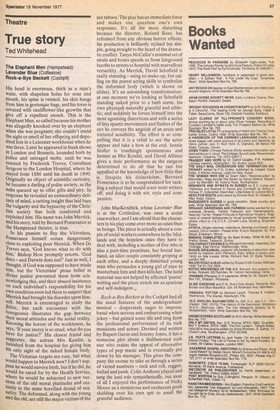Theatre
True story
Ted Whitehead
The Elephant Man (Hampstead) Lavender Blue (Cottesloe) Rock-a-Bye Beckett (Cockpit) His head is enormous, thick as a man's waist, with shapeless holes for nose and mouth, his spine is twisted, his skin hangs from him in grotesque bags, and his torso is covered with cauliflower-like growths that give off a repellent stench. This is the Elephant Man, so called because his mother was allegedly knocked over by an elephant When she was pregnant; she couldn't stand the sight or smell of her offspring and deposited him in a Leicester workhouse when he was three. Later he appeared in freak shows m London and Brussels, hounded both by Police and outraged mobs. until he was rescued by Frederick Treves, Consultant Surgeon to the London Hospital, where he stayed from 1886 until his death in 1890. Originally an object of scientific curiosity, be became a darling of polite society, as the fobs queued up to offer gifts and pity. In response he revealed an extraordinary delicacy of mind, a cutting insight that laid bare the vulgarity and the hypocrisy of the Christian society that both comforted and exploited him. His name was John Merrick, and his story, told by Bernard Pomerance at the Hampstead theatre, is true.
In his passion to flay the Victorians, Pomerance himself comes dangerously close to exploiting poor Merrick. When Dr Treves says, 'God knows what to do with him,' Bishop How promptly retorts, `God does — and Darwin does not!' Just as well, I thought, if God was supposed to have made hula, but the Victorians' pious belief in divine justice prevented them from acknowledging this, and their absurd insistence Of each individual's responsibility for his own condition even led them to suspect that Merrick had brought his disorder upon himself. Merrick is encouraged to study the Bible, but each encounter with the bourgeoisie illustrates the gap between their moral attitudes and the social reality. Knowing the horror of the workhouse, he says, 'If your mercy is so cruel, what do you have for justice?' His closest friend and skit:porter, the actress Mrs Kendal, is banished from the hospital for giving him his only sight of the naked female body.
The Victorian targets are easy, but what Would happen to Merrick now? I don't supPose he would survive birth, but if he did, he would be cared for by the Health Service, Where he would be subjected to new versions of the old moral platitudes and certainly to the same horrified denial of sexuality. The deformed, along with the young and the old, are still the major victims of the sex taboos. The play has an immediate force and makes one question one's own responses. It's all the more disturbing because the director, Roland Rees, has refrained from any obvious horror effects; his production is brilliantly stylised but simple, going straight to the heart of the dramatic conflict. Tanya McCallin's minimal set of struts and boxes speeds us from fairground booths to streets to hospital with marvellous versatility. As Merrick, David Schofield is really stunning — using no make-up, but calling on the purest acting skills to symbolise the deformed body (which is shown on slides). It's an astonishing transformation: at one moment we're looking at Schofield standing naked prior to a bath scene, his own physiqu naturally graceful and athletic; and suddenly he forces himself into the most agonising distortions and with a series of tiny spastic movements and flashes of the eye he conveys the anguish of an acute and tortured sensibility. The effect is so compelling that it is a relief to see the actor appear and take a bow at the end. Jennie Stoller is touchingly spontaneous and human as Mrs Kendal, and David Allister gives a stoic performance as the surgeon determined to do all that he can but appalled at the knowledge of how little that is. Despite his didacticism, Bernard Pomerance is to be congratulated for tackling a subject that would scare most writers off, and doing it with wit, style and compassion.
John MacKendrick, whose Lavender Blue is at the Cottlesloe; was once a social caseworker, and I am afraid that the characters in his play come over more as cases than as beings. The piece is actually about a couple of social workers somewhere in the Midlands and the hopeless cases they have to deal with, including a mother of five who is also a part-time prostitute, her brutal husband, an idiot couple constantly groping at each other, and a deeply disturbed young man who persuades a young girl of nine to masturbate him and then kills her. The lurid material was not helped by affected `poetic' writing and the piece struck me as spurious and self-indulgent., Rock-a-Bye Beckett at the Cockpit had all the usual features of the undergraduate musical — desperately eager to impress, banal when serious and embarrassing when jokey — but gained some life and zing from the professional performance of its rock musicians and actors. Devised and written by Rupert Gavin and Jeremy Jones, it has a nonsense plot about a disillusioned rock star who resists the appeal of alternative types of pop music and is eventually put down by his manager. This gives the company the excuse to take us through a series of varied numbers — rock and roll, reggae, ballad and punk. Colin Anthony played and sang the lead role sympathetically, but most of all I enjoyed the performance of Nicky Moore as a monstrous and exuberant punk skidding over his own spit to assail the grateful audience.


































 Previous page
Previous page